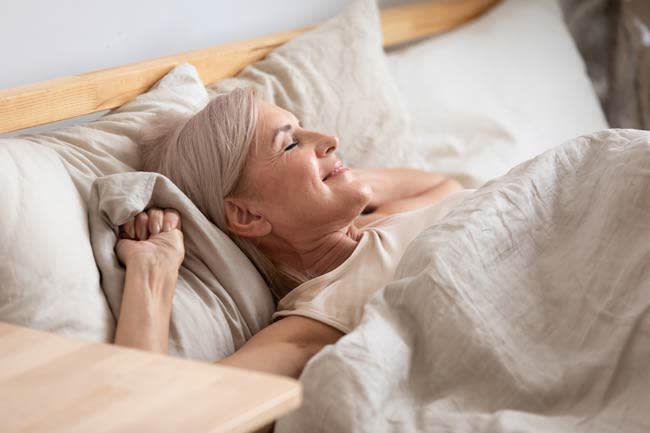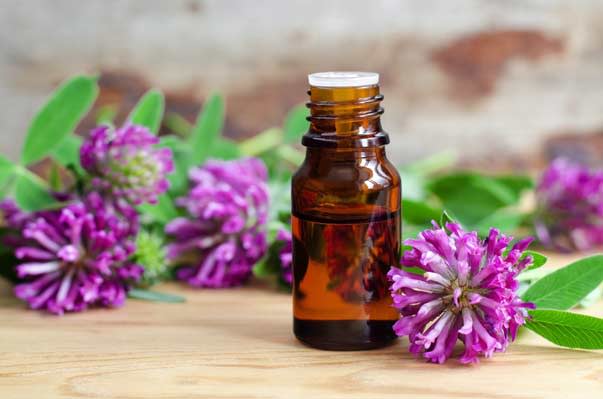Red Clover and the menopause; benefits and side effects

Author Miriam Ferrer, PhD Last updated 7th May 2020
- Ingredients & Nutrition
- Health Conditions
Red Clover and the menopause; benefits and side effects
Here we explore the origins and benefits of red clover, and how it helps with many of the symptoms of the menopause.
- What is red clover?
- Are there any side effects to red clover?
- Can red clover supplements help with the menopause?
- Summary
What is red clover?
Red clover (Trifolium pratense) is a flowering plant native to Europe, Western Asia and Northwest Africa. Its flower tops have been used in herbal medicine for many years.
The main chemical compounds found in red clover are isoflavones. These compounds are known as phytoestrogens; plant compounds that have a similar chemical structure to the hormone oestrogen1.
What are the health benefits and can red clover help with the menopause?

The best known and researched benefit for red clover is its effect on alleviating menopausal symptoms such as hot flushes2. There have also been additional studies undertaken on menopause-related issues such as osteoporosis and hypercholesterolemia (high blood cholesterol levels).
Studies in menopausal women using 80mg of red clover isoflavones have reported statistically significant differences in the number of hot flushes per day in comparison with those taking a placebo. Interestingly, the effect seems to be more noticeable in women that suffered at least five hot flushes per day3.
Does red clover help you sleep?
A common side effect of the menopause is difficulty sleeping8. One sleep study compared the effect of red clover against a placebo. After 90 days the red clover group showed improved sleep9.
Is red clover good for hair growth and your skin?
Another common symptom of menopause is hair loss and skin dullness. Due to its oestrogen effect, the isoflavones present in red clover could help improve skin and hair condition. Studies have shown that red clover can help with skin ageing caused by oestrogen deprivation9. In the same study where they looked at the effect of red clover in sleep, women reported an improvement of skin condition, after taking red clover supplementation10.
Are there any side effects to red clover?
Studies show that most people show no side effects from taking red clover. However, in rare cases, mild side effects include headaches, myalgia and nausea6.
Does red clover increase oestrogen levels?
Isoflavones have a similar chemical structure to oestrogen, so they can weakly bind to the same receptors as oestrogen and do some of its work. Because of that, they can affect the endocrine (hormonal) pathway and increase estradiol (one of the forms of oestrogen). Multiple studies have shown that red clover supplementation can increase estradiol levels in menopausal women4.
Does red clover imbalance your hormones?
As isoflavones have an oestrogen-like effect and can increase estradiol levels, they could, in theory, cause hormonal imbalance. However, studies have shown that red clover supplementation does not have a significant effect on other hormones in the body4.
Does red clover cause weight loss?
Since isoflavones can influence estradiol levels, they could cause weight gain. However, a human study of 93 post-menopausal women did not report any weight gain while taking red clover5.
Can red clover supplements help with the menopause?

Yes they can. When looking for an effective red clover supplement you should always look carefully at the amount of isoflavones, as these are the active components in the supplement.
It's important to know that due to its estrogenic activity, red clover should not be taken by pregnant or breastfeeding women, or by children.
Red clover should also not be taken by women who are using contraceptive drugs, such as birth control pills. The isoflavones in the red clover could compete with the oestrogen in the contraceptive, decreasing its effect.
Women who are using HRT (hormone replacement therapy) should not take red clover products, as it could interfere with the effects of the therapy.
Like many herbal products containing flavonoids, red clover can potentially interact with medications. Therefore you should consult with your doctor or pharmacist before taking red clover supplements, particularly if you are taking:
- Warfarin and similar anticoagulants7
- Medications metabolised by the liver, such as omeprazole or diazepam
Summary
Red clover has been used in folk medicine for treating several disorders, in particular helping with menopausal symptoms such as hot flushes. Although scientific evidence is not conclusive, it is a popular supplement among women looking for alternative means of dealing with the symptoms of the menopause.
References
- Andres S, Hansen U, Niemann B, Palavinskas R, Lampen A. Determination of the Isoflavone Composition and Estrogenic Activity of Commercial Dietary Supplements Based on Soy or Red Clover. Food Funct. 2015; 6(6):2017-2025.
- Chen MN , Lin CC , Liu CF. Efficacy of phytoestrogens for menopausal symptoms: a meta-analysis and systematic review. Climacteric. 2015; 18(2):260–269.
- Myers SP, Vigar V. Effects of a Standardised Extract of Trifolium Pratense (Promensil) at a Dosage of 80mg in the Treatment of Menopausal Hot Flushes: A Systematic Review and Meta-Analysis . Phytomedicine. 2017; 24:141-147.
- Ghazanfarpour M, Sadeghi R, Latifnejad Roudsari R, Mirzaii Najmabadi K, Mousavi Bazaz M, Abdolahian S, Khadivzadeh T. Effects of red clover on hot flash and circulating hormone concentrations in menopausal women: a systematic review and meta-analysis. Avicenna J Phytomed. 2015; 5(6): 498-511.
- Howes JB, Sullivan D, Lai N, Nestel P, Pomeroy S, West L, Eden JA, Howes L. The effects of dietary supplementation with isoflavones from red clover on the lipoprotein profiles of post menopausal women with mild to moderate hypercholesterolaemia . Atherosclerosis. 2000; 152(1):143-147.
- .Geller SE, Studee L. Soy and red clover for mid-life and aging. Climacteric. 2006; 9(4):245-263.
- KGe B, Zhang Z, Zuo Z. Updates on the clinical evidenced herb-warfarin interactions. Evid Based Complement Alternat Med. 2014; 2014:957362.
- Santoro N, Epperson CN, Matthews SB. Menopausal symptoms and their management. Endocrinol Metab Clin North Am. 2015; 44(3): 497-515.
- Circosta C, De Pasquale R, Palumbo DR, Samperi S, Occhiuto F. Effects of isoflavones from red clover (Trifolium pratense) on skin changes induced by ovariectomy in rats. Phytother Res. 2006; 20(1):1096-1099
- Lipovac M, Chedraui P, Gruenhut C, Gocan A, Kurz C, Neuber B, Imhof M. Effect of red clover isoflavones over skin, appendages, and mucosal status in postmenopausal women. Obstet Gynecol Int. 2011; 2011:949302.
- Hüser S, Guth S, Joost HG, Soukup ST, Kreienbrock L, Diel P, Lachenmeier DW, Eisenbrand G, Vollmer G, Nöthlings U, Marko D, Mally A, Grune T, Lehmann L, Steinberg P, Kulling SE. Effects of isoflavones on breast tissue and the thyroid hormone system in humans: a comprehensive safety evaluation. Arch Toxicol. 2018; 92(9):2703-2748
